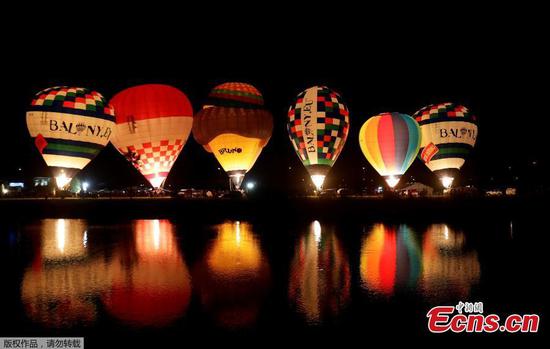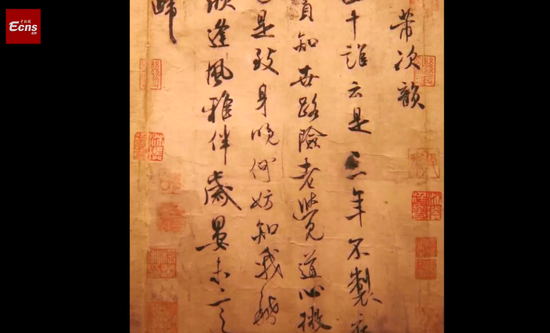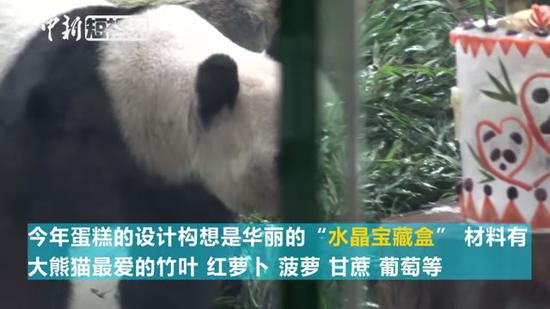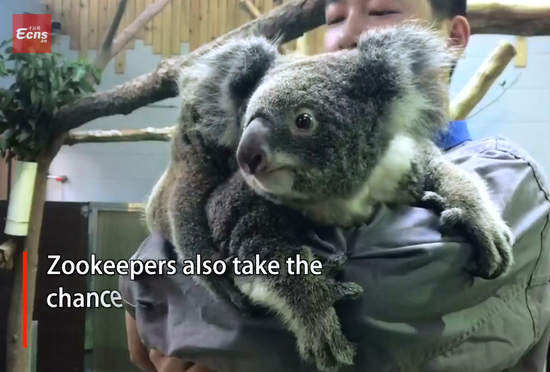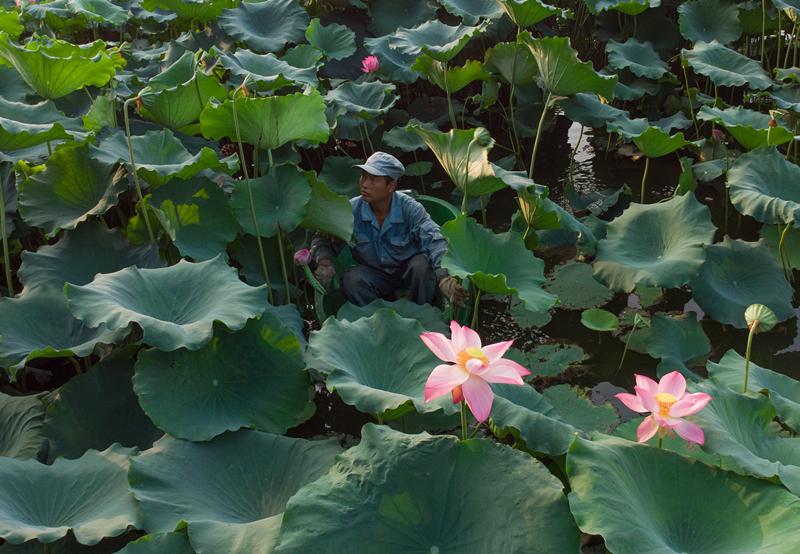
Maintenance worker Chen Laidi, a Hangzhou native, gathers lotus leaves and heads at West Lake. (Photo/China Daily)
Locals line up to make prized purchases at 'secret site' in Hangzhou
It was 7:25 on a Friday morning, too early for the crowds of tourists who flock daily to the banks, bridges and pagodas of West Lake in Hangzhou.
But as the summer heat rose at the UNESCO World Heritage site in the Zhejiang provincial capital, a fully laden sampan appeared on the motionless water, bobbing toward the lake's northern bank.
A rush of excitement passed through a small group waiting there-mostly middle-aged or elderly locals-as they formed an orderly line and unfolded their bags.
At the stroke of 7:30, the first in the line, a short, curly-haired woman in her 50s, rushed to the edge of the lake and showed her ticket.
It gave her permission to buy what she came for, 15 lotus leaves and four lotus heads, at a total cost of 20 yuan ($3).
"I had a friend who lives nearby come here at 3:30 am to stand in line for me and get the first ticket. I took the first morning bus, at 5:30, to get here," said Zhou Xiaohua, who secured pride of place in the line.
In the hometown of Taobao, the world's biggest e-commerce website, this traditional market stands out against the sweeping trend of e-commerce.
Nicknamed the "ghost market" by locals, it operates for just 20 minutes from Monday to Friday every summer from early July until late August.
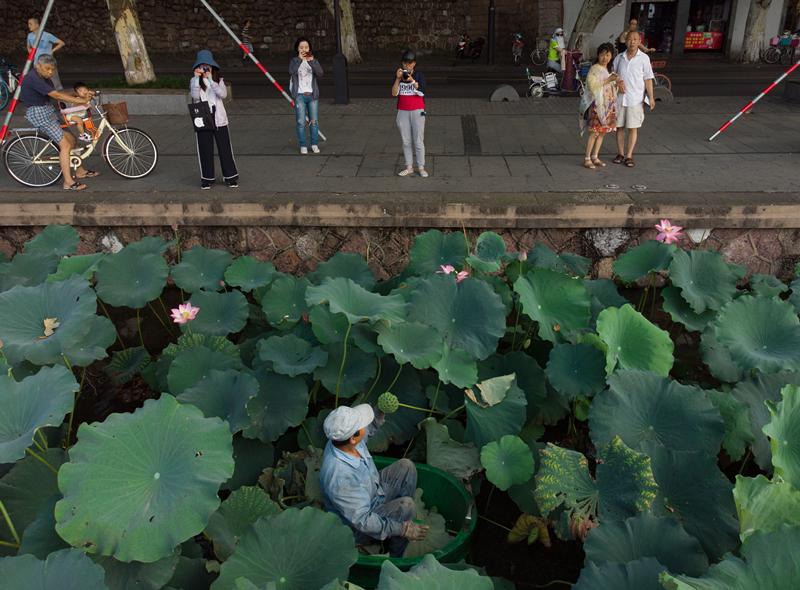
Chen Laidi, a Hangzhou native, gathers lotus leaves and heads at the West Lake. (Photo/China Daily)
It has no address, no signs, no exact opening hours, or even any salespeople, and sells just two things-tablecloth-sized lotus leaves and lotus heads filled with the plant's edible seeds, all handpicked from West Lake by its maintenance team.
The market revolves around the working schedule of the maintenance workers, and it handles the lotus harvest they reap from the lake, which is usually sufficient for the purchases of 30 people on any day.
Having been around for almost as long as Taobao, which launched in 2002, the market remains mostly a secret among locals.
Those who know about it are prepared to get up as early as 3am and travel for an hour across the city to visit the market. The attraction, they say, is the "magic" of the West Lake water, which nurtures what they believe are the best lotus leaves and seeds you can find.
Zhou, who has been coming to the market for more than five years, said, "It's even better than organic food." A native of Hangzhou, the retired accountant first heard about the market from her friend, who lives within cycling distance of the lake.
"Old people need little sleep. This is not some everyday commute-more like getting up to catch an early-morning flight for leisure. Besides, it's not really like standing and waiting ... like young people do for milk tea. We can go for morning exercise or grocery shopping after we get a ticket," Zhou added.
The tickets, made from torn notebook paper with handwritten numbers ranging from one to 30, are given out by a handful of veteran market patrons.
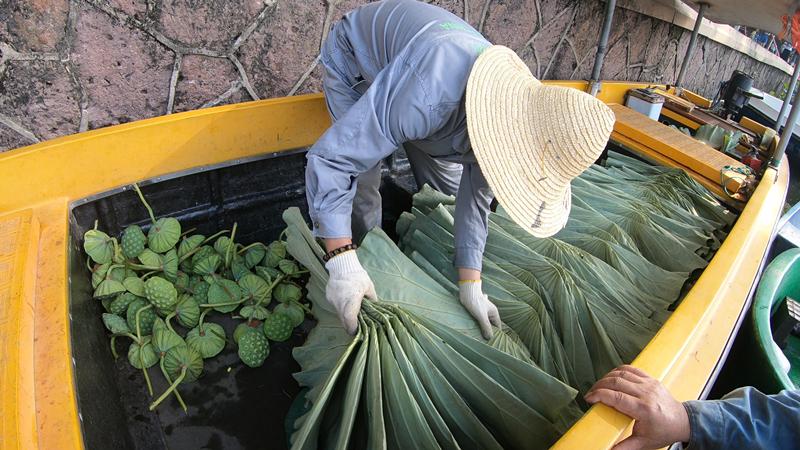
A maintenance worker prepares fresh leaves for the morning sale. (Photo/China Daily)
The patrons not only volunteer to arrive first at the lakeside site in the small hours, but have to sit on a bench that acts as the ticket office, and remain there until the close of trading to ensure that business is conducted in an orderly manner.
No one knows the names of the volunteers, and no personal information or contact details about them is exchanged.
A few regulars may recognize the faces of this mysterious "peace-keeping force", as the volunteers are known. The tickets they give out may be easy to copy, but are accepted by every lotus buyer and the maintenance team.
One ticket distributor, who gave his name only as Chen, said of the market arrangements, "It's like a gentlemen's pact."
The 67-year-old said it takes him 30 minutes to travel to the lake by motorcycle, and he only goes there occasionally to stand in for a much older local.
Chen Laidi, leader of the maintenance team, said, "Things got really chaotic when we first started, before someone volunteered to come up with a system to keep order."
The 59-year-old has been working on the lake, which is the size of nearly 1,000 soccer fields, with seven colleagues for nearly 30 years.

Local residents gather to buy fresh leaves in the morning. (Photo/China Daily)
The lotus-blooming season lasts for three months, but the team has to work all year round in the water-in sweltering and humid summers as well as freezing winters-to ensure the plants are at their best for the 100 million visitors who flock to the scenic attractions of Hangzhou every year.
In summer, their job is to sail into the forest of lotuses, which grow to a height of about 1 meter above the water, on a hand-paddled boat with just a single seat to remove excess leaves to provide more room for the plants to grow.
As temperatures in this "lotus forest" can soar to as high as 50 C in the hottest part of the day, the team has to finish its work before 8 am. The work cannot be done by modern equipment, as the lotuses are highly delicate and it takes decades of experience to tell just how many leaves should be removed.
"The trick is to provide enough air for the plant, but at the same time create the scene of a carpet of lotus leaves dotted with pink flowers," Chen Laidi said. "The lotuses are like my kids," he added.
The youngest son of a former West Lake maintenance team worker, he took over his father's job in 1979.
As the lotuses at the West Lake-one of the country's best-known freshwater lakes-became increasingly popular over the years, a special team was formed in the early 1990s dedicated to preserving the plants. Now, 23 lotus zones are scattered around the lake.
Chen Laidi said that trade in the lotus leaves and heads started in the late 1990s, when elderly people doing their morning exercises by the lake found workers' boats were full of them, and offered payment.
"For a year or two, they followed wherever our boats went, so we decided to settle on one place and gather all the harvest of the day for sale. The only problem is that demand always exceeds supply, which we can never change," he said.

A young woman uses Alipay to buy lotus heads and leaves. (Photo/China Daily)
Ni Bing, a 26-year-old administrative worker and the only young person among the 30 standing in line that day, said the West Lake's unique appeal motivates him to get up early and join those who are waiting.
"It's cool to say that my leaves and seeds come fresh from the lake and cannot be found online," said Ni, a native of neighboring Jiangsu province. He moved to Hangzhou one year ago for work and learned about the market from a local colleague.
He will use the lotus leaves either for tea or as a wrap for beggar's chicken, one of the best-known local dishes, in which spring chicken and sticky rice are wrapped into a lotus leaf. At the market, Ni learned how to cook the dish from local seniors.
Legend has it that it was invented by a beggar who accidentally obtained a chicken from a benefactor.
Too poor to own a pot to cook it in properly, he used lotus leaves from the lake and roasted the chicken with leftovers, including rice, on an open fire. The distinctive aroma from the leaves gives the chicken an unexpectedly fresh flavor, which has placed it at the top of Hangzhou's cuisine for centuries.
Wang Yong, head chef at the Jinsha restaurant at the Four Seasons hotel in Hangzhou, said, "It's not only about the aroma from the leaves, but more the idea of eating seasonal and local fare."
Wang, a native of Shanghai, has run the kitchen at the most popular fine-dining restaurant in Hangzhou for eight years. He argues that while the city has been growing almost as fast as first-tier ones economically, if not faster, there is a more deeply rooted emotional attachment to traditions and local elements even among some of his wealthiest patrons. This has seen his beggar's chicken ordered as frequently as other pricey dishes.
"At a time when everything is becoming more accessible and journey times between cities and towns are getting shorter with high-speed trains, the more local and seasonal it is, the more precious the food is," Wang said.











